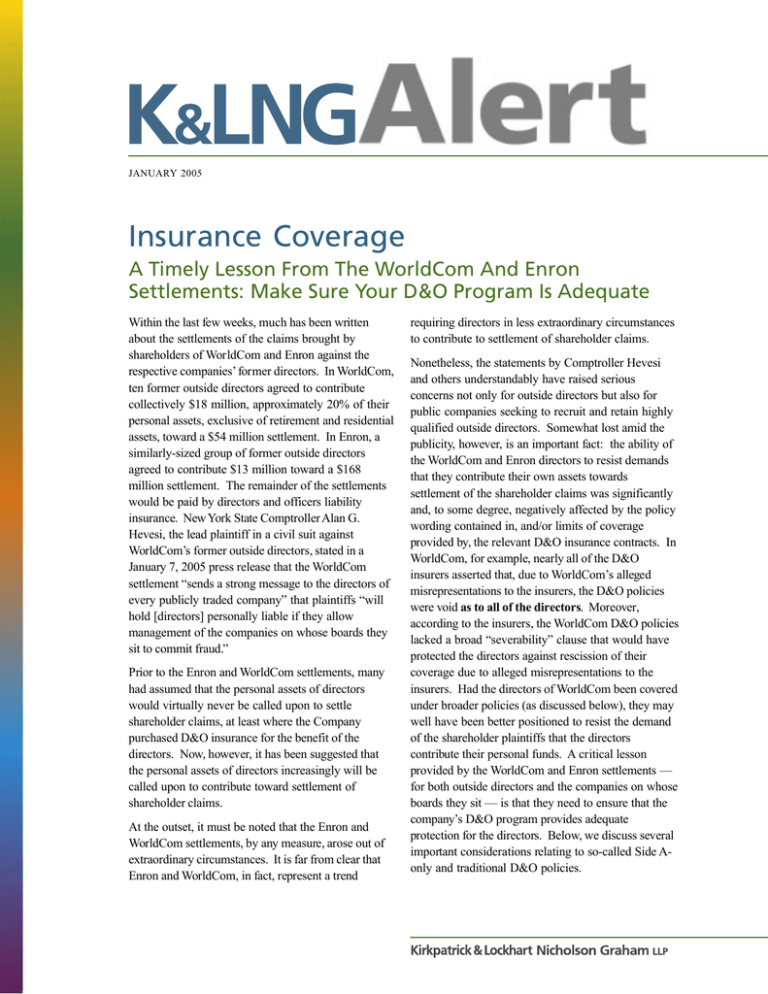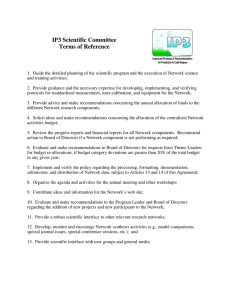
JANUARY 2005
Insurance Coverage
A Timely Lesson From The WorldCom And Enron
Settlements: Make Sure Your D&O Program Is Adequate
Within the last few weeks, much has been written
about the settlements of the claims brought by
shareholders of WorldCom and Enron against the
respective companies’ former directors. In WorldCom,
ten former outside directors agreed to contribute
collectively $18 million, approximately 20% of their
personal assets, exclusive of retirement and residential
assets, toward a $54 million settlement. In Enron, a
similarly-sized group of former outside directors
agreed to contribute $13 million toward a $168
million settlement. The remainder of the settlements
would be paid by directors and officers liability
insurance. New York State Comptroller Alan G.
Hevesi, the lead plaintiff in a civil suit against
WorldCom’s former outside directors, stated in a
January 7, 2005 press release that the WorldCom
settlement “sends a strong message to the directors of
every publicly traded company” that plaintiffs “will
hold [directors] personally liable if they allow
management of the companies on whose boards they
sit to commit fraud.”
Prior to the Enron and WorldCom settlements, many
had assumed that the personal assets of directors
would virtually never be called upon to settle
shareholder claims, at least where the Company
purchased D&O insurance for the benefit of the
directors. Now, however, it has been suggested that
the personal assets of directors increasingly will be
called upon to contribute toward settlement of
shareholder claims.
At the outset, it must be noted that the Enron and
WorldCom settlements, by any measure, arose out of
extraordinary circumstances. It is far from clear that
Enron and WorldCom, in fact, represent a trend
requiring directors in less extraordinary circumstances
to contribute to settlement of shareholder claims.
Nonetheless, the statements by Comptroller Hevesi
and others understandably have raised serious
concerns not only for outside directors but also for
public companies seeking to recruit and retain highly
qualified outside directors. Somewhat lost amid the
publicity, however, is an important fact: the ability of
the WorldCom and Enron directors to resist demands
that they contribute their own assets towards
settlement of the shareholder claims was significantly
and, to some degree, negatively affected by the policy
wording contained in, and/or limits of coverage
provided by, the relevant D&O insurance contracts. In
WorldCom, for example, nearly all of the D&O
insurers asserted that, due to WorldCom’s alleged
misrepresentations to the insurers, the D&O policies
were void as to all of the directors. Moreover,
according to the insurers, the WorldCom D&O policies
lacked a broad “severability” clause that would have
protected the directors against rescission of their
coverage due to alleged misrepresentations to the
insurers. Had the directors of WorldCom been covered
under broader policies (as discussed below), they may
well have been better positioned to resist the demand
of the shareholder plaintiffs that the directors
contribute their personal funds. A critical lesson
provided by the WorldCom and Enron settlements —
for both outside directors and the companies on whose
boards they sit — is that they need to ensure that the
company’s D&O program provides adequate
protection for the directors. Below, we discuss several
important considerations relating to so-called Side Aonly and traditional D&O policies.
SIDE A-ONLY D&O COVERAGE
So-called Side A-only D&O policies provide insurance
coverage for directors and officers against claims that
are not indemnified by the company or, in some cases,
that are not indemnifiable by the company. Most
public companies do not purchase Side A-only
policies, in large part because such policies can be
extremely expensive and are not necessarily available
to all companies. Nonetheless, a growing number of
insurers offer such products, and companies
increasingly are looking to purchase broad form Side
A-only coverage. Some important aspects of Side Aonly coverage are described below.
■
Misrepresentation/Rescission Issues
Many claims against directors are based on alleged
errors in financial statements, public filings and
press releases. Because companies often submitted
the same documents to insurers to procure D&O
insurance, insurers increasingly seek to use the
underlying plaintiffs’ allegations of errors in such
documents as a basis to void D&O insurance
policies. In certain situations, e.g., WorldCom, D&O
insurers have contended that a false statement by a
single officer can divest all directors and officers of
coverage. This potential defense, if not properly
addressed through appropriate policy wording,
increases the pressure on directors to contribute
their personal assets to settle shareholder claims.
Most Side A-only policies contain favorable
“severability” clauses, which, as noted, apparently
were absent from the WorldCom program. This
wording provides that coverage may be rescinded
only as to the specific individual(s) that had actual
knowledge of misstatements in the application.
Indeed, some recently introduced Side A-only
policies expressly state that the insurer will not seek
to rescind coverage under any circumstances.
■
Bankruptcy
From the perspective of directors and officers, D&O
insurance is perhaps most needed when a company
or organization is in bankruptcy and is unable or
unwilling to meet its obligation to advance defense
costs and pay judgments or settlements. Yet, many
traditional D&O policies contain potential
impediments to accessing coverage in such
circumstances. For example, because the corporate
debtor is typically an insured under a traditional
D&O policy (for, among other things, its own
2 JANUARY 2005
securities liability under so-called Side C
coverage), bankruptcy trustees and creditors
committees increasingly contend that the D&O
policy is an asset of the estate and the proceeds
thereof should be reserved for the debtor—not for
the directors. A director seeking coverage under a
Side A-only policy, however, should not be subject
to this potential obstacle to coverage, because the
Side A-only policies do not cover the company at
all.
TRADITIONAL D&O COVERAGES
The traditional D&O insurance policy provides “Side
A” coverage for non-indemnifiable loss, “Side B”
coverage for the company’s indemnity obligations to
directors and officers, and “Side C” coverage for
securities claims asserted directly against the
company. Among the myriad of provisions that
should be considered are the following:
■
■
“Priority Of Payments” Provisions
Traditional D&O policies may contain “priority of
payments” provisions, which require that claims
under the direct “Side A” coverage for directors and
officers (i.e., claims not indemnified by the
corporation) are to be paid before claims under the
“Side B” corporate reimbursement and “Side C”
entity coverages. Where a policy contains this
type of priority provision, courts likely will be less
inclined to hold D&O policy proceeds to be an
asset of the corporate debtor’s estate and more
inclined to allow the insured directors to obtain
coverage thereunder.
Misrepresentation/Rescission Issues
As noted above, where a claim involves allegedly
erroneous financial statements or public filings, a
D&O insurer may attempt to rescind the
D&O policy based upon alleged material
misrepresentations, particularly if the insured
submitted the same documents to the D&O insurers
in applying for coverage. Also as noted above,
D&O insurers increasingly have contended that a
false statement by a single officer can divest all
directors and officers of coverage under a D&O
policy. A properly written “severability” clause
can protect directors against this potential
coverage defense by requiring that the insurer may
invoke the defense as to a director only if the
director was aware of the misrepresentation.
KIRKPATRICK & LOCKHART NICHOLSON GRAHAM LLP
Given the recent settlements and predicted
concomitant hardening of the insurance markets,
companies and directors may find it prudent to take a
close look at their existing D&O insurance programs
so as to obtain a better understanding of what
coverage is and is not provided, what can be done to
enhance the protection provided, and what can be
done to minimize efforts by the D&O insurers to
reduce the coverage.
Thomas M. Reiter
treiter@klng.com
412.355.8274
Roberta D. Anderson
randerson@klng.com
412.355.6222
The Insurance Coverage practice group at Kirkpatrick & Lockhart Nicholson Graham LLP offers an international
policyholder-oriented practice on behalf of Fortune 500 and numerous other policyholder clients. Its lawyers have
authored Policyholder’s Guide to the Law of Insurance Coverage and edited the Journal of Insurance Coverage. For
further information, please consult our website at www.klng.com.
International Contact
Boston
Dallas
Harrisburg
London
Los Angeles
Miami
Newark
New York
Pittsburgh
San Francisco
Washington
Peter J. Kalis
John M. Edwards
Robert Everett Wolin
Carleton O. Strouss
John Magnin
David P. Schack
Daniel A. Casey
Anthony P. La Rocco
Eugene R. Licker
James R. Segerdahl
Edward P. Sangster
Matthew L. Jacobs
pkalis@klng.com
jedwards@klng.com
rwolin@klng.com
cstrouss@klng.com
jmagnin@klng.com
dschack@klng.com
dcasey@klng.com
alarocco@klng.com
elicker@klng.com
jsegerdahl@klng.com
esangster@klng.com
mjacobs@klng.com
+1.412.355.6562
+1.617.261.3123
+1.214.939.4909
+1.717.231.4503
+44 (0) 20 7648 8168
+1.310.552.5061
+1.305.539.3324
+1.973.848.4014
+1.212.536.3916
+1.412.355.6784
+1.415.249.1028
+1.202.778.9393
Fax +1.412.355.6501
Fax +1.617.261.3175
Fax +1.214.939.4949
Fax +1.717.231.4501
Fax +44 (0) 20 7648 9001
Fax +1.310.552.5001
Fax +1.305.358.7095
Fax +1.973.848.4001
Fax +1.212.536.3901
Fax +1.412.355.6501
Fax +1.415.249.1001
Fax +1.202.778.9100
www
w.. k l n g . c o m
BOSTON
■
DALLAS
■
HARRISBURG
■
LONDON
■
LOS ANGELES
■
MIAMI NEWARK
■
■
NEW YORK PITTSBURGH
■
■
SAN FRANCISCO
■
WASHINGTON
Kirkpatrick & Lockhart Nicholson Graham is a combination of two limited liability partnerships, each named Kirkpatrick & Lockhart Nicholson Graham LLP, one established in Delaware, USA,
and one incorporated in England.
This publication/newsletter is for informational purposes and does not contain or convey legal advice. The information herein should not be used or relied upon in regard to any particular facts
or circumstances without first consulting a lawyer.
Unless otherwise indicated, the lawyers are not certified by the Texas Board of Legal Specialization.
© 2005 KIRKPATRICK & LOCKHART NICHOLSON GRAHAM LLP. ALL RIGHTS RESERVED.





